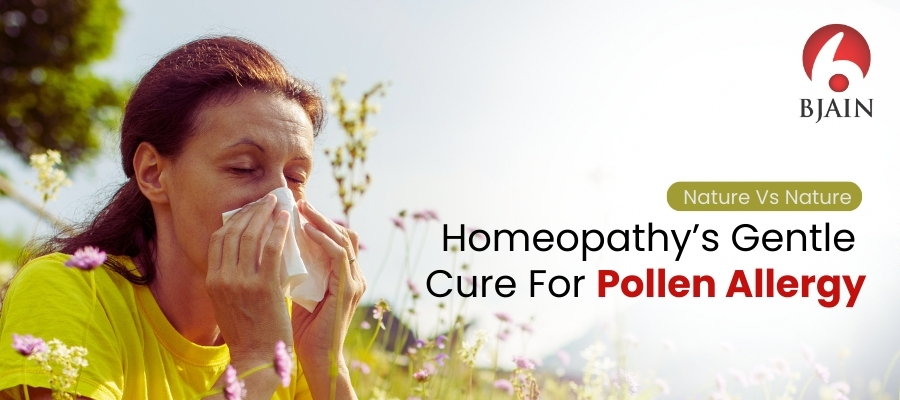Overview
Pollen Allergy, also known as Hay Fever or Seasonal Allergic Rhinitis is a prevalent condition that affects millions worldwide. Triggered by pollen grains from plants such as trees, grasses and weeds, this condition has a significant impact on a person’s quality of life especially during the spring and autumn seasons. Homoeopathy offers a gentle and holistic approach in the management of pollen allergy which is tailored to the individual needs.
What is Pollen Allergy?
Pollen is a fine powdery substance released by plants for reproduction and pollen allergy is an immune system response to these pollens. It doesn’t cause any harm in most of the people, however, in some individuals it leads to an allergic reaction. In such people, the immune system recognizes pollen as a foreign substance known as allergens posing a threat, in response to which the immune system fights back by releasing chemicals like histamine and tryptase, producing symptoms of a hypersensitive allergic reaction. According to the Ministry of Science and Technology, Government of India, the prevalence of pollen allergy among the Indian population is estimated to be around 20-30% every year.
What are the common sources of Pollen Allergy?
- Trees namely oak, cedar and maple
- Grasses such as timothy and ryegrass produces pollen in an unusual manner. Their pollen grains are non-sticky and majorly spreads through the wind.
- Weeds like ragweed and pigweed releases pollen in abundance specially during autumn season.
What are the symptoms of Pollen Allergy?
The symptoms of pollen allergy typically resemble those to any respiratory allergy, the severity of which may vary in different individuals depending upon their immune response.
- Nasal symptoms like sneezing, congestion, running nose, postnasal drips are commonly seen.
- Eye symptoms like itchy, red and watery eyes prevails in majority of people.
- Respiratory symptoms like persistent cough, wheeze and even shortness of breath known as dyspnea are noted in severe cases.
- Allergic shiners characterized by swollen bags under the eyes is one of the most characteristic symptoms of pollen allergy.
These symptoms are usually accompanied by general symptoms like fatigue, headache, dizziness, anxiety and usually gets worse during early morning when pollen levels are at their peak.
What are the risk factors for Pollen Allergy?
Several factors play a significant role in developing allergy to pollen grains. These are:
- Genetic like family history of asthma or allergies.
- Environmental factors like living in areas with high pollen levels.
- Seasonal exposure during peak pollen seasons.
How is Pollen Allergy diagnosed?
- A detailed medical history with symptoms, triggers and family history.
- Allergy specific tests like:
- Skin Prick Test – This test can be performed in people of all age groups including infants.
- Serological Test – Blood test that measures the levels of allergen specific immunoglobin E known as IgE.
What is the role of diet and lifestyle in managing Pollen Allergy?
A balanced diet and healthy lifestyle plays a pivotal role in strengthening the immune system and reducing the anticipation of allergic reactions.
Dietary modifications
Consume food rich in Vitamin C, omega 3 fatty acids and antioxidants to prevent inflammation.
- Maintain adequate hydration to promote healthy mucous membranes.
Lifestyle Tips
- Indoor exercises should be preferred during high pollen season.
- Practice yoga or meditation to manage stress efficiently as stress can exacerbate the symptoms of allergy.
Homeopathic Medicines for Pollen Allergy
- Allium Cepa – It is suitable for bland watery eyes and acrid nasal discharge that irritates the upper lip along with sneezing and a tickling cough. The symptoms worsen indoors and in warmth and gets better in fresh air. The person feels thirsty throughout.
- Sabadilla – Effective for long paroxysms of sneezing, itching in the nose with irritating runny discharge, a feeling of lump in the throat and the person feels drowsy on least exertion.
- Arsenicum Album –Burning nasal discharge with a wheezing cough and swelling under the eyes are the main symptoms accompanied by restlessness.
- Natrum Muriaticum – This remedy is helpful in episodes of runny nose alternating with dryness and stinging in the nasal cavity with puffy face. Emotional stress aggravates the symptoms and the person craves for salty food.
- Euphrasia Officinalis – It is particularly helpful when tears are acrid and nasal discharges are bland. These symptoms usually get worse during the day and improves at night.
- Apis Mellifica – This remedy aids nasal congestion with stinging and burning pain which gets better in cold air.
- OMEO Allergy Tablets – It is a specialty product of BJain Pharmaceuticals Pvt. Ltd which is ideal for symptoms like sneezing, irritation of the nose, watery discharge from nose and eyes, nasal blockage, loss of smell, itching and burning in the eyes with headache.
Conclusion
Homeopathic medicines provides a comprehensive and natural approach in the management of pollen allergies by acting on the root cause and enhancing body’s natural immunity, thereby providing an alternative management approach for those seeking relief without relying solely on conventional drugs. It thus embraces wellness and transforms the way people experience allergy seasons.

Dr Anusha Dewan
BHMS, MPH, MBA Healthcare Management, a RESEARCH OFFICER at BJain Pharmaceuticals Pvt. Ltd holds degree from Nehru Homoeopathic Medical College, Delhi University and Academy of Scientific and Innovative Research. As a dedicated and result oriented public health consultant, she leverages to create innovative healthcare solutions for improved patient outcomes.


